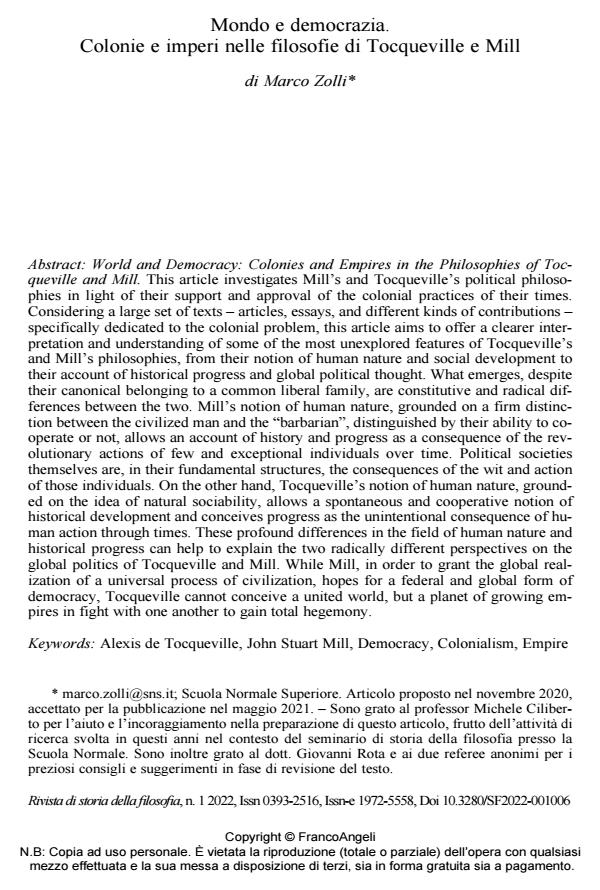Mondo e democrazia. Colonie e imperi nelle filosofie di Tocqueville e Mill
Journal title RIVISTA DI STORIA DELLA FILOSOFIA
Author/s Marco Zolli
Publishing Year 2022 Issue 2022/1
Language Italian Pages 28 P. 103-130 File size 200 KB
DOI 10.3280/SF2022-001006
DOI is like a bar code for intellectual property: to have more infomation
click here
Below, you can see the article first page
If you want to buy this article in PDF format, you can do it, following the instructions to buy download credits

FrancoAngeli is member of Publishers International Linking Association, Inc (PILA), a not-for-profit association which run the CrossRef service enabling links to and from online scholarly content.
World and Democracy: Colonies and Empires in the Philosophies of Tocqueville and Mill. This article investigates Mill’s and Tocqueville’s political philosophies in light of their support and approval of the colonial practices of their times. Considering a large set of texts - articles, essays, and different kinds of contributions - specifically dedicated to the colonial problem, this article aims to offer a clearer interpretation and understanding of some of the most unexplored features of Tocqueville’s and Mill’s philosophies, from their notion of human nature and social development to their account of historical progress and global political thought. What emerges, despite their canonical belonging to a common liberal family, are constitutive and radical differences between the two. Mill’s notion of human nature, grounded on a firm distinction between the civilized man and the "barbarian", distinguished by their ability to cooperate or not, allows an account of history and progress as a consequence of the revolutionary actions of few and exceptional individuals over time. Political societies themselves are, in their fundamental structures, the consequences of the wit and action of those individuals. On the other hand, Tocqueville’s notion of human nature, grounded on the idea of natural sociability, allows a spontaneous and cooperative notion of historical development and conceives progress as the unintentional consequence of human action through times. These profound differences in the field of human nature and historical progress can help to explain the two radically different perspectives on the global politics of Tocqueville and Mill. While Mill, in order to grant the global realization of a universal process of civilization, hopes for a federal and global form of democracy, Tocqueville cannot conceive a united world, but a planet of growing empires in fight with one another to gain total hegemony. Keywords: Alexis de Tocqueville, John Stuart Mill, Democracy, Colonialism, Empire
Marco Zolli, Mondo e democrazia. Colonie e imperi nelle filosofie di Tocqueville e Mill in "RIVISTA DI STORIA DELLA FILOSOFIA" 1/2022, pp 103-130, DOI: 10.3280/SF2022-001006